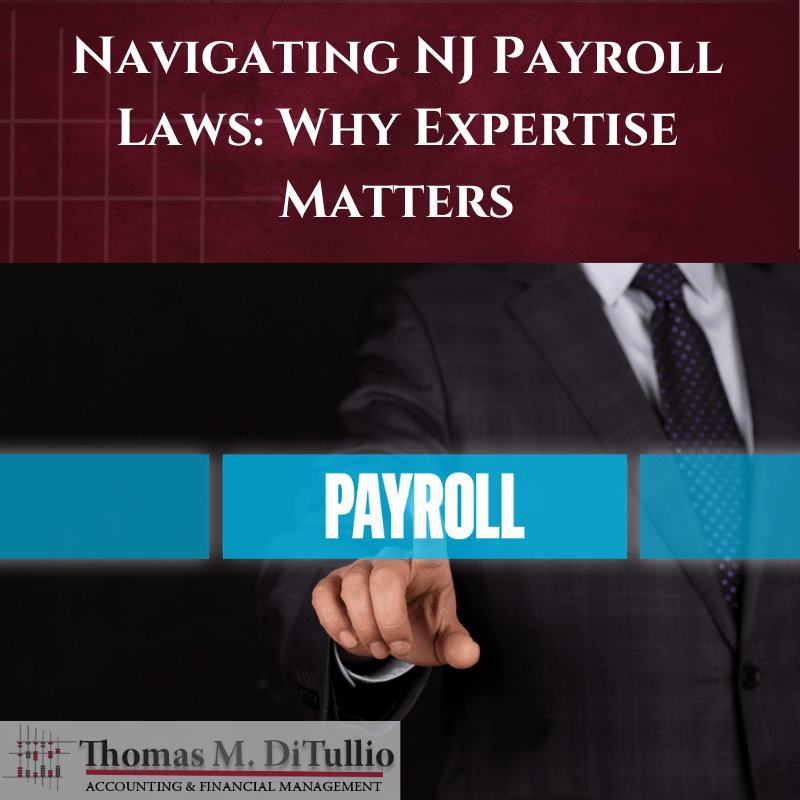Navigating NJ Payroll Laws: Why Expertise Matters
Like many other things in New Jersey, the payroll tax laws are complex. As a small business owner, you must ensure compliance with the relevant laws that apply and make sure to remit the correct payroll taxes to the appropriate tax authorities. Failing to pay your payroll taxes on time or in full can result in substantial penalties. Here is some information about New Jersey payroll tax laws from a South Jersey accountant and why you should consider hiring the professionals at TMD Accounting.
Overview of Payroll Tax Laws in New Jersey
As an employer, you must comply with federal and state payroll tax laws. Federal laws include mandatory withholding of federal income taxes, Social Security, Medicare, and Federal Unemployment Insurance. New Jersey employers must also comply with the following state laws.
State Income Tax Withholding Laws
Under New Jersey’s laws, you must withhold state income tax from your employees’ paychecks and remit them to the state at regular intervals. These laws apply unless you also must withhold the income taxes of another jurisdiction at an equal or higher rate than New Jersey’s rate. You also have the legal obligation to withhold state income taxes for employees who are non-residents. Under New Jersey’s progressive tax system, you’ll need to understand the state’s income tax rates, which range from 1.4% to 10.75%. The highest rate applies to employees whose gross incomes range from $1 million to $5 million, and the lowest rate applies to those earning up to $20,000.
Employers must withhold income taxes of 21.3% from their employees’ wages applied retroactively to Jan. 1, 2020, as a catch-up provision. You must file payroll tax withholdings each quarter, and you must file a year-end payroll tax return electronically.
Reciprocity With Pennsylvania
New Jersey and Pennsylvania have a reciprocity agreement. This means that if you have an employee who lives in Pennsylvania, you’ll need to have them fill out Form NJ-165 to avoid New Jersey state tax withholding.
Unemployment Insurance
Most New Jersey employers must pay state unemployment insurance taxes. If you have one or more employees to whom you pay wages of more than $1,000 per year, you are required to pay state unemployment taxes. State unemployment taxes in New Jersey are based on a wage base of $34,400 per year. The rates range from 0.5% to 5.8% and are calculated each fiscal year. Your experience rate is calculated by taking the contributions you have paid and subtracting any benefits charged. You then divide that amount by your company’s average annual payroll. New employers are assigned rates for the initial three years based on their experience. Employers must also pay state disability insurance taxes, family leave insurance, and workforce development funds. Typically, these three types of taxes total around 0.0005%. When you pay state unemployment taxes in New Jersey, you might be able to take a discount of up to 5.4% on your federal unemployment taxes.
Workers’ Compensation
Employers in New Jersey must either carry workers’ compensation insurance or qualify to self-insure. To self-insure, you must seek approval from the Department of Banking and Insurance and show that your company has the financial ability to meet its legal obligations.
In addition to these various types of taxes employers must pay, there are a variety of forms that must be completed.
Why You Should Hire a Small Business Accountant in NJ to Handle Payroll
Below are some reasons why you should consider hiring a small business accountant in New Jersey to handle payroll for your company.
Leveraging Expertise
When you outsource payroll to a small business accountant at TMD Accounting, you can leverage their expertise and specialized knowledge. This can help to ensure you remain legally compliant and reduce the potential of costly errors.
Cost Savings
A professional accountant can help your business save money over the long run when you outsource your payroll to them by offering efficient, streamlined services. You can avoid the costs of hiring full-time employees to handle payroll while receiving valuable tax advice.
Ensure Regulatory Compliance
Payroll tax laws in New Jersey are complex, and complying with them can be time-consuming. It can be overwhelming to deal with regulations, laws, and payroll taxes if you don’t have a background in finance or accounting. By hiring a professional accounting firm, you can ensure regulatory compliance and avoid costly penalties.
Avoid Penalties
Most business owners simply don’t have the time to properly handle payroll and are prone to mistakes. This can result in potentially costly penalties. A South Jersey accountant can help you avoid fines, penalties, and fees assessed by the Internal Revenue Service by processing your company’s payroll correctly.
Maximize Deductions on Your Tax Returns
As accounting and tax experts, South Jersey accountants can help you identify and maximize available deductions on your taxes that are associated with payroll. This can help to keep your payroll costs low and reduce your taxable income.
Small businesses can enjoy numerous benefits by outsourcing payroll to professional accountants. An accounting firm can provide tailored solutions for your business to meet your payroll needs while also advising you about taxes and helping with filing your returns.
Find an Accountant for My Small Business
If you’re looking to outsource your small business payroll to an accountant in New Jersey, you should reach out to TMD Accounting. Our experienced accounting professionals can provide quality payroll services for your company. To learn more about the tailored solutions we can offer to your business, call us today at 1-856-228-2205.

